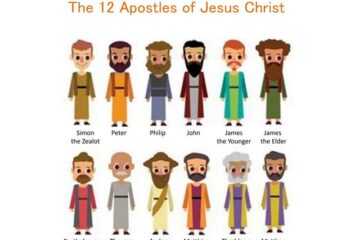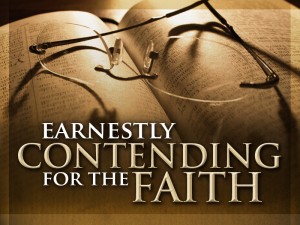False teachers and, consequently, religious error are very real evils. (Jer. 23; 1Jn. 4:1; Matt. 7:15-20; Matt. 24:3-5). In fact the books of 2 Peter and Jude deal almost exclusively with the reality, the characteristics, the design, the mode of operation, the teaching and the destiny of false teachers.
Concerning religious error, 2 Pet. 3:16 speaks of those who “wrest” the scriptures. “Wrest” as it appears in this text is found nowhere else in the New Testament. The word means “to twist with a windlass,” and so “to strain, to torture, to distort;” also, “to turn from the proper position, to pervert.” The Greek word is strebloo. Hence, the word means to twist the scriptures “from their intended purpose in order to make them teach matters never intended by the sacred writers.” (Guy N. Woods).
Pertaining to this, Gayle Oler wrote the following in Just A Moment: “A New York enthusiast has a good collection of etchings, one of them being the leaning tower of Pisa, which hangs over his writing desk. For a long time it persisted in hanging crooked despite the fact that he straightened it every morning. At last he spoke to the maid, asking her if she were responsible for its lopsided position each morning. ‘Why, yes,’ she said. ‘I have to hang it crooked to make the tower hang straight.’ That is exactly how a lot of people, not recognizing the real position and beauty of the scriptures, deal with the Bible. They twist the word of God in order to justify their own actions and doctrine and to make them all appear right.”
EFFECTS OF RELIGIOUS ERROR
(1) All of earth’s sorrows has come about because of religious error. Every tear we have ever shed, every open grave we have stood beside, every adversity that has assailed us, and every shadow that has crossed our path, has come about as a result of Satan preaching a religious error in the garden of Eden, and such being believed and obeyed. (Gen. 3:1ff).
(2) The effect of religious error can be seen in the story of the prophet of God and the old prophet, as related in 1 Kgs. 13.
(3) The effects can be seen in Jeroboam, the son of Nebat, who committed and propagated religious error. He changed the object of worship, the place of worship, the time of worship, and the priesthood. (1 Kgs. 12:25-33). “He departed not from the sins of Jeroboam, the son of Nebat,” or a similar statement, appears many times in the books of 1 and 2 Kings and 1 and 2 Chronicles. The sins of Jeroboam is mentioned more than 20 times and his sins cast their dark shadows across 15 reigns of the kings of Israel and were the prime cause of Israel’s captivity from which she never returned. (1 Kgs. 14:15-16). Truly, how tragic is religious error!
(4) Religious error is destructive. 2 Pet. 2:1; 3:16.
(5) Religious error causes divisions. God’s doctrine is “one” (the word “doctrine” always appears in the singular when it has reference to the doctrine of God or the doctrine of Christ, 1 Tim., 2 Tim., Tit.; See also Eph. 4:1-6); necessarily, then, it produces unity. And, as sure as night follows day, when anything else is taught – religious error – division obtains. Now read Jn. 17:20, 21; 1 Cor. 1:10; Mk. 3:24-35.
(6) Religious error renders our worship vain. (Matt. 15:9; Jer. 23:16).
HOW DOES RELIGIOUS ERROR COME ABOUT; OR WAYS IN WHICH THE SCRIPTURES ARE “WRESTED”?
(1) Removing passages from their setting and giving them a meaning never intended by the Holy Spirit. (a) For example, using 1 Cor. 15:8 to teach that Paul was born again on the road to Damascus. This passage does not have to do with his becoming a Christian. Paul was rather talking about his seeing Christ – thus, becoming qualified as an apostle – after the due time of seeing Christ. Christ had ascended back to glory when Paul saw him. (b) When one uses Gal. 3:26 to teach that one is saved by faith only, he is guilty of wresting the scriptures in this way. Why not also read vs. 27?
(2) Placing a misconstruction on a given text. (a) Making “rock” refer to Peter in Matt. 16:18 is an illustration of this. The word “rock” in this text, instead of referring to Peter, refers to the confession that Peter made. See 1 Cor. 3:11. (b) Making “filth of the flesh,” as it appears in 1 Pet. 3:21, refer to sin is another example. Instead of this statement referring to sin, it has reference to dirt on the body, as many of the modern speech translations point out so clearly. To make the statement refer to sin makes Peter contradict himself in the passage.
(3) Changing the scriptures to suit the times. By saying God loves all people and he would not condemn homosexuality today. By suggesting that 1 Tim. 2:11-12 is not applicable regarding women preachers. Not taking of the Lord’s supper on the first day of the week.
(4) Misusing the scriptures to justify evil practices. (a) When one uses 1 Tim. 5:23 in an effort to condone social drinking he is guilty of wresting the scriptures. In this text Paul was discussing the use of wine for medicinal purposes. (b) Using the parable of the tares to justify the failure of practicing church discipline is also misusing a text of the Bible to justify negligence. In the parable, “the field is the world,” not the church. (Matt. 13:38).
(5) Literalizing the figurative. This error is committed when Matt. 26:26 is explained to mean that the bread becomes the actual flesh of the Lord. The bread became no more the literal flesh of the Lord, even though he said, “This is my body,” than the Lord became a literal door when he said, “I am the door.” (Jn. 10:9).
(6) By misquoting the scriptures. This could be done by taking the word “not” out of the parenthesis in 1 Pet. 3:21 and making the text read “The like figure whereunto even baptism doth also now save us ‘not’…”
(7) Using statistics to apply relative values to scripture. Stating that the bible mentions faith more times than baptism and so the meaning of baptism is not as important as faith.
WHAT CAUSES RELIGIOUS ERROR?
(1) Ignorance. “Jesus answered and said unto them, Ye do err, not knowing the scriptures, nor the power of God.” (Matt. 22:29). The false teachers of Peter’s day were in error concerning the second coming of Christ because they were willingly ignorant. (2 Pet. 3:5).
(2) A rejection of the Bible as the all-sufficient guide in matters religious. (2 Pet. 1:3; 2 Tim. 3:16-17; Jude 3). Because of this rejection we have those who believe in special revelations, laying on of hands, tongue speaking, etc. Also, creeds and manuals have resulted from this rejection. The structure of the church has been ‘improved’ with new titles of church authority both individual and in council form. A pope, cardinals, church boards, presidents, and other officials have been created.
(3) An improper division of the word. (2 Tim. 2:15). Because of the improper division of the word, there are those who still believe the Sabbath is binding, that incense should still be offered, and instrumental music and infant baptism may be practiced.
(4) A desire to force the Bible to harmonize with preconceived ideas. An example of this would be one who believes in sprinkling, turning to Isa. 52:15 and using this as a proof text for his theory, when all the time the word “sprinkle” in the text means to “startle”.
(5) The rejection of the authority of Christ. (Matt. 28:18-20). Because of this we have the pope, and ecclesiastical councils and synods. Nowhere in the bible is anyone given authority over the church but Christ.
(6) Using different standards in matters religious. 1 Cor. 1:10 teaches us we must all use the same standard in religion (“…be perfectly joined…”). Otherwise, religious chaos results. We would live in a chaotic world unless we followed some given standards of measurement and weight in the physical world.
(7) A failure to discriminate. (Heb. 5:14). We should also be able to discriminate between aids and additions, laws and expediencies, essentials and non-essentials, the gospel and the law of Moses, the church and denominationalism, etc.
IN VIEW OF THE EXISTENCE OF RELIGIOUS ERROR, WHAT SHOULD THE CHURCH DO?
(1) Beware of, and be on guard for, false teachers. (Matt. 7:15; 24:4; Col. 2:8, 18; 2 Pet. 3:16, 17).
(2) Try the teachers. (1 Jn. 4:1; Rev. 2:2). God’s word is the standard or reed by which these are tried. (Acts 17:11-12; Gal. 1:6-9; 2 Tim. 3:16-17).
(3) Do not take heed to false teachers and teaching. (Deut. 13:1-3; Jer. 23:16). Deaf ears must be turned to instruction that causeth us to err. (Pro. 19:27).
(4) Mark and avoid false teachers. (Rom. 16:17, 18; 2 Tim. 3:5; Tit. 3:10).
(5) Oppose and expose all false doctrine and teachers. It is not enough to refrain from teaching error, we must also expose it! (Eph. 5:11). One of our brethren has this motto, “To let an error go uncorrected is to be a participant in it.” Paul opposed and exposed religious error. (Acts 19:8, 9; 17:22-31). Aquila and Priscilla opposed religious error. (Acts 18:24-28). Elders are instructed to do so. (Tit. 1:9-11). We must oppose and expose religious error boldly and firmly, yet in a spirit of love. (Eph. 6:19; 4:15). We must earnestly contend for the faith. (Jude 3). We must be set for the defense of the gospel. (Phil. 1:7, 17).
CONCLUSION
Error condemns. (2 Pet. 2:1). But the truth makes men free. (Jn. 8:32). Do not allow your salvation to be dependent on false teaching or a lack of self-study to learn with diligent precision what the scriptures say with regards to worship and Christian living. As individuals, we are responsible for seeking the truth and obeying the word of God. No one can speak for us on the day of judgement and ignorance will not be an excuse. The bible says in Acts 17:30 “and the times of this ignorance God winked at; but now commandeth all men everywhere to repent”. You will not be able to say that brother so-and-so taught me this and that as the reason for your error of understanding. If you consider how much in this life you go through to insure that you are able to make informed decisions on “things” such as choice of houses, cars, financial investments, etc, how much more valuable is your soul?


